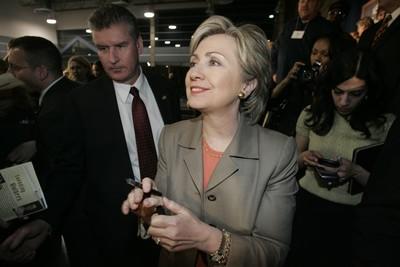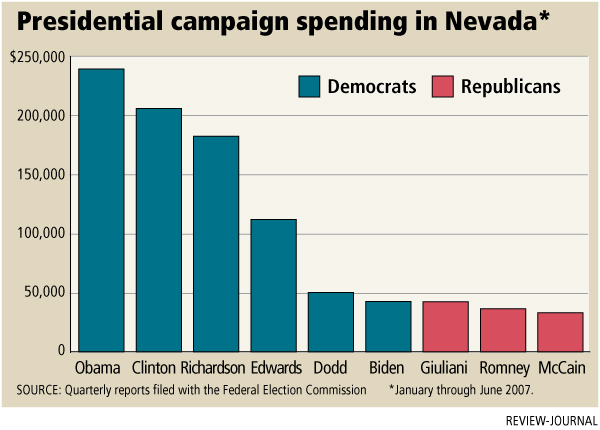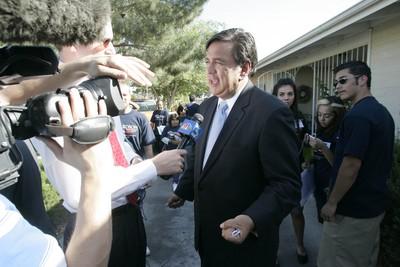Spending paints state’s political scene blue
To rent her campaign office in Las Vegas, Democratic presidential candidate Hillary Clinton is paying $5,437 a month. Her rival Barack Obama is paying $8,453.
Republican candidates aren't contributing at all to the Nevada rental market, because none of them has an office here.
But John McCain dropped nearly $19,000 at the sexy nightclub Tabu, at the MGM Grand, and $116.72 at a Krispy Kreme in Reno.
On the other hand, Rudy Giuliani didn't report the money he spent at a Costco in Reno and a Target in Las Vegas, where he swung through to shop and shake hands in March.
How do we know all this? It's in their campaign finance reports.
An analysis of campaign expenditures in Nevada finds that the Democratic candidates are spending a lot of money here, while the Republicans are not.
Although he trails Clinton in polls and fundraising in Nevada, Obama is the candidate who spent the most here through June 30, according to quarterly reports filed with the Federal Election Commission. His campaign reported about $240,000 in campaign expenditures to Nevada addresses in the first two quarters.
Obama's campaign spending here was more than five times the amount spent by the Republican who reported paying out the most in the Silver State, Rudy Giuliani, with $42,237 in Nevada expenditures.
That was less than the Democrat who spent the least among the major candidates, Joe Biden, who put $42,531 into Nevada in the first six months.
While much attention gets paid to candidates' state-by-state fundraising, state-by-state spending is more telling, said Jennifer Duffy, an analyst for the Washington, D.C.-based Cook Political Report.
"Money raised in a state doesn't stay in a state necessarily," she said. "Money spent is a better reflection of the effort they're (candidates) putting into a state, followed by time spent."
California, she said, is the classic example: Candidates treat the state like an ATM, raising scads of money from wealthy donors that they will largely spend on campaign organizations elsewhere.
Nevada has had the same reputation. But based on the new numbers, Duffy said, Nevada is no longer merely a "donor state" for the Democrats, but remains so to the Republicans, who have raised more money while spending far less time in Nevada.
The spending numbers are a rough metric at best, experts caution, as the states where expenditures get recorded may be deceptive. Many campaigns are still paying staffers from out of state at their old addresses, for example. Credit-card payments appear both in the state the purchase was made and the state where the bills are sent. Plane tickets are often booked from afar.
The Edwards campaign buys all its computers in North Carolina, then ships them to field offices. The Clinton campaign appears to be spending big in Utah, but that's just because the IRS office to which her campaign pays payroll taxes is located there.
"Reporting in a state won't be precisely correlated with spending in the state," said Bob Biersack, spokesman for the Federal Election Commission. But apples-to-apples comparisons can be made if the data are examined in detail, he noted.
Rent is a good example, since it generally is paid in the location where the resource is used.
The three top Republicans, Giuliani, McCain and Mitt Romney, pay all their staffers at a single address, making it impossible to tell where personnel are being deployed. But that wouldn't make much difference in Nevada, because none of those campaigns has an office in the state.
McCain did have a staffer based in Las Vegas who was responsible for several Western states, but he has left the campaign in the turmoil of recent weeks. In the first two quarters, Jason Huntsberry made more than $28,000, recorded at the same Virginia address where all McCain's staff salaries were paid.
If that amount is included in McCain's Nevada spending, he goes from the lowest-spending to the highest-spending Republican here, with about $61,000 in Nevada expenditures -- still just one-fourth of what Obama is spending here.
Romney last month hired a Nevada staffer and a consultant, but neither's name appears in his reporting, likely because they hadn't yet been paid by June 30, when the reporting period closed.
Nevada's second-biggest spender after Obama is Clinton, with $205,000 paid in Nevada. In third is New Mexico Gov. Bill Richardson, also a Democrat, with $182,000. Then comes former vice presidential nominee John Edwards, who has paid $111,000.
Duffy said campaigns at this point should be trying to conserve the money they've raised, because they will need it for expensive media blitzes and voter mobilization late in the game.
"All the money McCain has spent, does he have something to show for it? Not really," she said of the fact that the Arizona senator has burned through nearly all the money he's raised, yet is falling in most polls.
"Romney, on the other hand, he's spending a lot, but he kind of does have something to show for it. I've dubbed him the tortoise, slow and steady," Duffy said.
Romney and Obama are both candidates new to the national stage who are trying to build grass-roots campaigns. Especially in a caucus state like Nevada, that costs money. Unlike a primary, a caucus requires people to commit to coming to a meeting in their neighborhood and publicly declaring their support.
That's why Obama is spending so much in Nevada: He's mounting a big outreach effort that will pay off later, spokeswoman Jen Psaki said.
"We're invested right now in people and bodies on the ground," she said, noting the campaign recently opened its third Nevada office, in Elko.
Obama has run a distant second or third in most Nevada polls, which have shown Clinton dominating by double-digit margins.
He is third in Nevada fundraising, although his campaign claims that those numbers look lower than they really are because donations under $200 don't have to be itemized.
Obama's campaign said it raised $34,000 in the second quarter from such uncounted donors in Nevada, in addition to the $41,000 that was reported.
However, without collecting the same information from all the other candidates, it's impossible to know how he stacks up to others in that regard.
Privately, rivals say Obama's campaign is spending too freely -- witness that $8,500 rent. But he can afford it, Duffy noted. The top three Democratic campaigns are outraising the top three Republicans by about 3 to 1.
A newcomer to the early-contest field, Nevada is still competing for attention with the traditional early states, Iowa and New Hampshire, as well as South Carolina, now fourth.
The Democratic campaigns are still generally spending more in Iowa and New Hampshire than in Nevada, with the exception of Richardson, who is seen as banking on Nevada as the regional candidate. He is spending more here than in New Hampshire or South Carolina.
One member of Richardson's payroll is Fernando Romero, president of Hispanics in Politics, a group that has endorsed Richardson. A spokesman for Richardson said Romero was brought on staff after the endorsement was made and there was no quid pro quo. Romero remains the group's president.
In case you're job-hunting, the Democratic campaigns appear to pay about the same. In the second quarter, Richardson lists spending $85,000 on 20 listed staff members in Nevada. Clinton lists $109,000 for 19 staffers. Obama lists $88,000 for 17 staffers, while Edwards' report shows $60,000 to 16 staffers.
That's take-home pay alone, and it can't be divided to find an average salary because staffers have come on at different times as the campaigns are constantly adding workers.
The highest-paid Nevada campaign worker appears to be Clinton's state director, Robby Mook, who is taking home $4,200 every two weeks -- about $100,000 a year.
Also doing well for himself is Romney's financial consultant in Nevada, Cory Christensen, who's taken in almost $27,000 in irregular payments since February despite not being a full-time staffer.
McCain supporter Sig Rogich, a major Republican figure in Nevada, appears to be a volunteer. He is listed only as a donor in the candidate's reports.
University of Nevada, Las Vegas political scientist David Damore said the spending numbers show that despite local Republican officials' (and campaigns') protests to the contrary, Nevada is not being taken seriously as an early state by the GOP.
"By this point, if they were serious about it, they'd be putting down organizations here, but they're sticking to the old script of Iowa and New Hampshire," Damore, a Democrat, said of the Republican campaigns.
A spokeswoman for McCain, Brooke Buchanan, said that's not the case.
"We are in the midst of refiguring our operations in the early states, and that obviously includes Nevada," she said. "We hope to have someone on the ground soon."
Although Romney is currently buying network advertising time only in Iowa, New Hampshire and South Carolina, spokeswoman Sarah Pompei pointed to the campaign's recent hires in Nevada as proof he is making an effort here.
She said the former Massachusetts governor "will be there in the coming weeks."
Republicans' relative invisibility in Nevada has been attributed to a late start moving up the caucus; turmoil within the state party; lack of a national figure like the Democrats' Harry Reid, the Senate majority leader, to promote it; and lack of blessing from the Republican National Committee.
But Duffy posited an intriguing new theory. Nevada, she said, might be to the Democrats what South Carolina is to the Republicans. Democrats are spending less time and effort in South Carolina than the Republicans are, and many assume it is Obama's to lose because of the sizable black vote there.
The Republicans see South Carolina as a crucial proving ground to show they can win with the socially conservative, religious Republican vote, Duffy pointed out.
Similarly, the Democrats may see Nevada as the place to prove they can win Hispanic and labor voters.
In each case, the constituency in question will be important to the eventual nominee in the general election, but probably not to his or her opponent.
That is, the Democratic nominee won't likely do much courting of hard-core religious Republicans, and the Republican nominee won't expect much crossover among diehard union activists.
"South Carolina is sort of the mirror image of Nevada," Duffy said. "All the effort the Democrats are putting into Nevada, they're not putting into South Carolina."




















